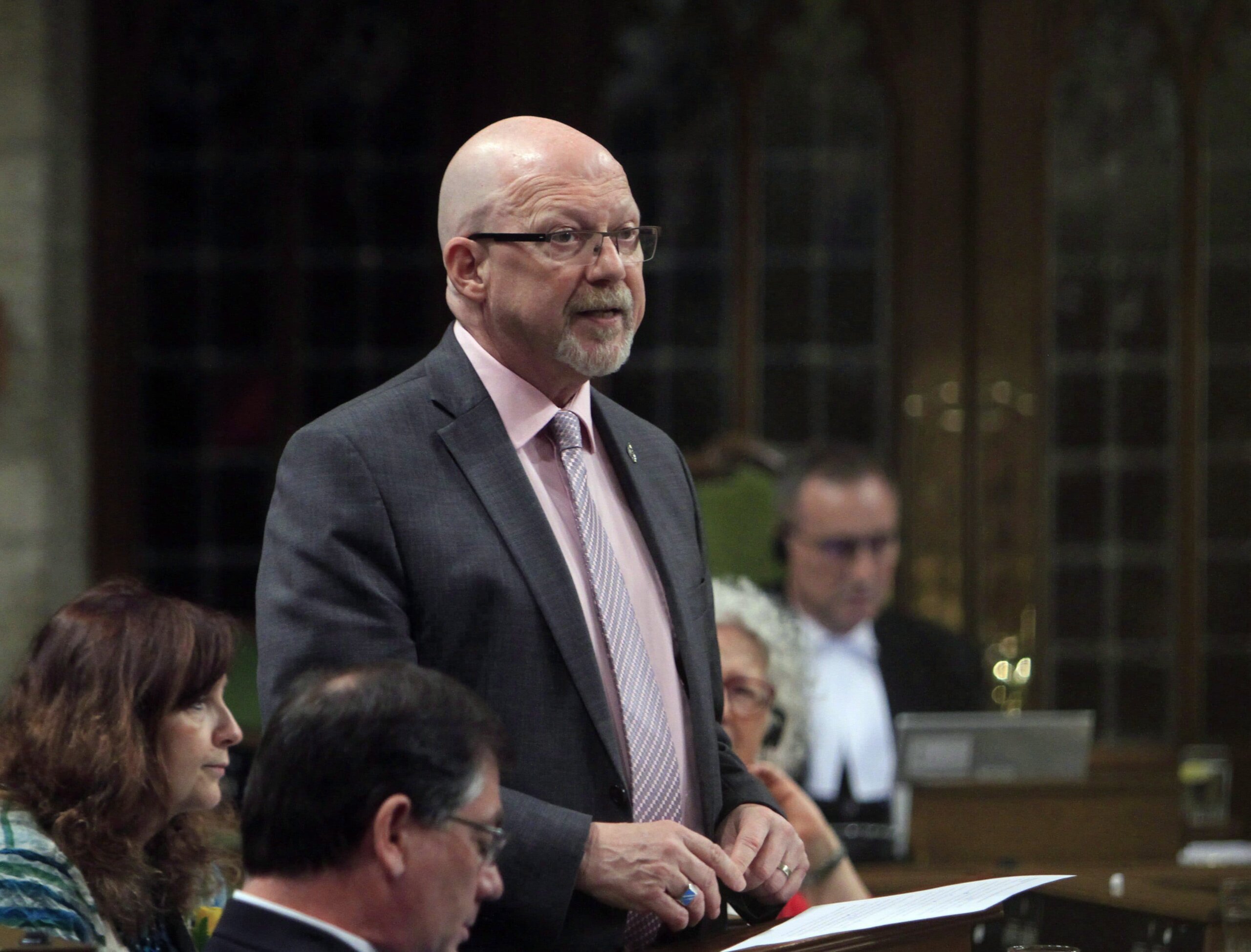NDP MP (Esquimalt—Saanich—Sooke) Randall Garrison says that after over 10 years on Parliament Hill, he’s starting to feel a sense of accomplishment when it comes to the LGBTQ2S+ issues he’s been championing since he was first elected. And, he says, it feels a little less lonely in Parliament as there are currently a record number of other out MPs and senators.
“It’s nice to have a few more queers in this Parliament,” Garrison quips. “And a bit more diversity, especially in our caucus, with Blake [Desjarlais], who is Two-Spirit, and Lisa Marie [Barron], who is bisexual. The usual joke is that there are three of us, so we can have a caucus.”
Garrison says he never planned on being a politician, not thinking it was possible while growing up gay. He was recruited as a candidate by Jack Layton based on his 20 years of teaching criminal justice at Camosun College in Saanich, BC, and his international human rights work. He has been an MP and the federal NDP’s spokesperson on LGBTS2S+ issues since 2011.
Garrison cites three particular international projects he was involved in before he got into politics.
“I co-chaired the UN Human Rights observer mission for the referendum in East Timor on independence,” Garrison says. “I worked on a peace-building project in Indonesia, where I met my husband, and then I worked for Amnesty International in Afghanistan.”
Garrison says that he was always out about his sexual orientation on these missions, but it may not have been the first thing he told people—particularly in Afghanistan, because of the extreme hostility.
“It was always part of human rights-observing that I did as part of those missions, which was to look at what was happening with queer people,” Garrison says.
Since he’s been an MP, Garrison says he has been working consistently to advance the LGBTQ2S+ rights agenda, This started with a commitment to a private members’ bill to include gender identity and expression in the hate crimes section of the Criminal Code and the Canadian Human Rights Act, which passed the House of Commons under a Conservative majority, but it died in the Senate when there wasn’t enough time for it to make it through committee before the 2015 election was called. It did pass as a government bill in the following Parliament.
“It’s nice to have a few more queers in this Parliament.”
“I’m particularly proud of having worked with the transgender community on getting the major gap in human rights that was left in Canada filled,” Garrison says. “But like everything, if people aren’t in the community, aren’t organizing and aren’t stepping up, the work that I do here isn’t really possible.”
“I worked with trans people from all across the country, and got a lot of them to see their Members of Parliament, in particular in the Conservative Party, and in the end, we got 18 Conservatives to vote for the bill,” Garrison says. “That’s how it got through.”
Garrison also notes that he took on the blood ban/deferral period for men who have sex with men early on in his time in office.
“We’re almost at the finish line, but we’re not there yet,” Garrison says. “In 2014, I introduced the first motion in the House of Commons to end the ban, but I started talking to Canadian Blood Services in 2012, and have been working with them. But again, success in lifting the ban really came when the community got organized, and the All Blood Is Equal campaign provided the impetus to get this done.”
Garrison adds that he worked on the issue of ending conversion therapy, and was happy to be one of the players who got that done in the current parliament, acting as a go-between with the Conservatives and the Liberals.
Garrison says that while he’s glad to see these successes on initiatives he has worked on, there are still more issues he’s trying to get action on.
“One of the disappointments is on HIV funding,” Garrison says. “I bring it up from time-to-time, but I don’t seem to be able to move anybody—that if we spent relatively little money in terms of health budgets across the country, we could eradicate HIV, and we’ve known that for at least a decade now and we haven’t done it. So, we have increasing cases when we should be seeing the end of HIV.”
Garrison notes that he finds the resistance to this spending to be a form of complacency, in part because most or the new cases are among racialized Canadians, Indigenous people and young gay men—more marginalized communities who aren’t necessarily in touch with those who are making the decisions.
Garrison has also been championing finding a safe path for queer and trans refugee claimants to safety in Canada.
“When I first got elected, I worked with some Conservative cabinet ministers on what I would call individual rescues, and that’s when I realized that this wasn’t good enough—that we needed to identify how those whose lives were in imminent risk could get protection in Canada,” Garrison says. “I’m still getting the answer, every time we get a new immigration minister, that we don’t discriminate. And that misses the point completely.”
Garrison points out that someone who is queer in Afghanistan doesn’t have any idea that they can make a claim for asylum based on their sexual orientation, and they have no practical way to do that because they are technically not a refugee as they are still in-country.
“I’ve been asking the government since 2014 to consider allowing some in-country claims for queer people in the countries where it’s most dangerous and impossible to get out,” Garrison says.
Garrison notes additional challenges for queer and trans refugees once they are settled in Canada, because there aren’t any trauma-informed programs from mainstream settlement agencies that consider people coming from societies openly hostile to queer people, and adjusting to being able to live openly in Canada.
Garrison’s last ongoing agenda item is reforming employment equity laws.
“It still astounds me that queer people aren’t in it,” Garrison says. “I first introduced a bill to add them in 2019, and the government is now doing a consultation on this, so I feel like we’re going to get there on that.”
Within his party, Garrison says he has been trying to encourage people to donate to a fund to help support queer and trans candidates.
“As the Conservatives fear, I’m always recruiting,” Garrison jokes. “I do a lot of phone calls on behalf of the party to encourage people to think about running. As Jack Layton pointed out when he recruited me, I’d been asked multiple times and I wouldn’t do it. I pointed out that it’s a bit of a jump for people in the queer community to think about, especially in the current political climate, and exposing your partner and your family to all of the hate that will come. There’s a lot of hesitancy for people to step forward.”
Garrison says that in the current environment, there has been an increase in the threats he has received, including a recent incident where police needed to get involved.
“It’s much more frequent, and much nastier than I’ve seen in the past,” Garrison says.


 Why you can trust Xtra
Why you can trust Xtra


